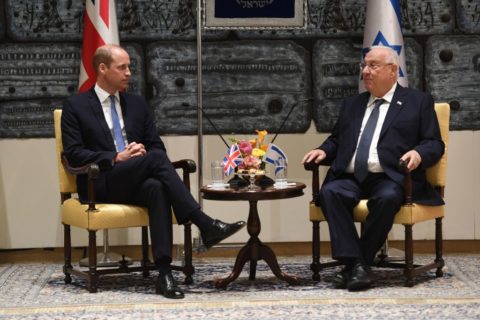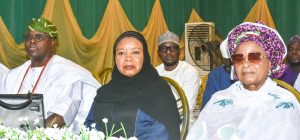
By Emmanuel Yashim
The recognitions of the Palestinian state by the U.K., Canada, and Australia ahead of the UN General Assembly (UNGA)’s high-level debate were hailed in many quarters as a diplomatic breakthrough.
Yet, Israel rejected the move outright, while the U.S. maintained its veto at the Security Council.
In his UNGA address, the U.S President, Donald Trump, called for cessation of hostilities and described the recent recognition of Palestinian statehood by some Western countries as a “reward” for Hamas.
“We have to get it done; we have to negotiate peace; we have to get the hostages back; we want all 20 back.
“As if to encourage continued conflict, some of this body is seeking to unilaterally recognise the Palestinian state; the rewards would be too great for Hamas terrorists, for their atrocities,” Trump said.
UN Secretary-General, António Guterres, had earlier in his address at the assembly, endorsed Palestinian statehood.
Nonetheless, he said there was no justification for the horrific Oct. 7, 2023, Hamas attacks on Israel nor the collective punishment of the Palestinian people.
He, once again, called for an immediate ceasefire in Gaza, the release of all hostages, and safe, unconditional, and unhindered humanitarian access.
“We must recommit ourselves to the two-state solution before it is too late. Let’s be clear: Statehood for the Palestinians is a right, not a reward.
“And denying statehood would be a gift to extremists everywhere. Without two States, there will be no peace in the Middle East, and radicalism will spread around the world,” he said.
For many observers, the practical impact of these recognitions remains uncertain.
Into this fraught arena stepped Nigeria.
At the assembly, Vice-President Kashim Shettima restated Nigeria’s support for a two-state solution as the only viable path to peace.
He underscored Nigeria’s belief that Palestinians, like all peoples, possess an inalienable right to self-determination, and urged the international community to move beyond symbolism to meaningful action.
“We say, without stuttering and without doubt, that a two-state solution remains the most dignified path to lasting peace for the people of Palestine.”
“The people of Palestine are not collateral damage in a civilisation searching for order.
“They are human beings, equal in worth, entitled to the same freedoms and dignities that the rest of us take for granted,” he said.
His words were widely interpreted as a return to Nigeria’s foreign policy tradition of siding with justice and anti-colonial struggles.
For decades, Nigeria backed liberation movements in Southern Africa and consistently supported Palestinian rights at the UN.
More recently, however, its voice on the Middle East had grown less audible.
Dr Philippa Osim Inyang, Senior Research Fellow in International Law at the Nigerian Institute of International Affairs, amplified Nigeria’s stance.
“Nigeria’s stance at the UNGA reaffirms its established position and aligns with the African Union’s consistent support for Palestine.”
She recalled that Nigeria recognised the 1988 Palestinian Declaration of Independence and has repeatedly voted for pro-Palestinian resolutions at the UN.
“This is not a new departure but a reminder that Nigeria remains committed to principles of self-determination and justice,” she said.
Africa has spoken generally and consistently with one voice on Palestine, framing it as part of the unfinished business of decolonisation.
The African Union continues to back a two-state solution, while individual states like South Africa and Algeria have taken firmer steps, including legal action against Israel at international courts.
Prof. Sylvester Odion of Lagos State University said that Africa’s voice resonated because of its moral weight, even if the global power imbalance remained.
“UNGA resolutions can generate overwhelming moral pressure, but without Security Council enforcement they remain symbolic.
“The U.S. veto ensures that Israel is protected from binding sanctions or peacekeeping measures.
“That is why Nigeria and Africa must link the Palestinian question to broader UN reform,” he said.
A policy analyst, Magnus Onyibe, argues that recognition alone is not enough.
“The Palestinian question is ultimately about territory, security, and governance.
“Recognition boosts legitimacy, but without negotiation and enforcement mechanisms, the situation on the ground remains unchanged.
“Nigeria should use its diplomatic capital to push for concrete steps like ceasefires and humanitarian access,” he said.
Civil society voices in Nigeria echo this call for engagement.
A human rights advocate, Hauwa Mustapha, said that Nigeria had historically stood on the side of justice from apartheid South Africa to Namibia’s independence.
“On Palestine, we cannot afford to be passive; we must engage consistently at the UN and within Africa,” he said.
Moving forward, analysts highlight three areas where Nigeria and Africa can play a decisive role:
Firstly, Africa must reaffirm the recognition of a Palestinian state by making the support for its statehood unequivocal, in line with the AU positions.
Secondly, Africa must strengthen diplomacy by lobbying for humanitarian corridors, ceasefire mechanisms, and accountability frameworks.
Thirdly, the continent must press for UN reform by using the Palestinian deadlock to amplify Africa’s call for fairer representation at the Security Council.
Dr Adewale Banjo, a Middle-East analyst in Abuja, underscored the broader stakes.
“The Palestinian issue is not just about the Middle East. It is a test of whether international law and multilateralism still carry meaning. Nigeria, by standing with law and justice, reinforces its identity as a moral voice in world politics,” he said.
Proponents of international affairs believe that the recognition of Palestinian statehood by the UK, Canada, and Australia reflects growing impatience with the status quo, even among Israel’s allies.
However, they argue, recognition is not a substitute for political will or negotiations.
With Israel determined to block Palestinian statehood and the U.S. veto entrenched at the Security Council, the gulf between principle and practice remains wide.
For Nigeria, Shettima’s intervention at the UNGA was more than a speech.
It was a reminder that Africa’s most populous nation still has a voice in shaping debates on justice and global governance.
Analysts say whether Abuja sustains that leadership or retreats into silence will determine how history judges its role.
Yashim writes for the News Agency of Nigeria




I am really thankful to the holder of this web site who has shared this great
paragraph at at this time.
Oh my goodness! Incredible article dude! Many thanks, However I am
encountering difficulties with your RSS. I don’t
understand why I can’t subscribe to it. Is there anybody else having similar RSS issues?
Anybody who knows the solution can you kindly respond?
Thanks!!
采用高效谷歌外推策略,快速提升网站在搜索引擎中的可见性与权重。谷歌外推
搭载智能站群程序,自动化搭建与管理,为SEO项目提供核心驱动力。站群程序
iwin – nền tảng game bài đổi thưởng uy tín, nơi bạn có thể thử vận may và tận hưởng nhiều tựa game hấp
Đến với J88, bạn sẽ được trải nghiệm dịch vụ cá cược chuyên nghiệp cùng hàng ngàn sự kiện khuyến mãi độc quyền.
Với giao diện mượt mà và ưu đãi hấp dẫn, MM88 là lựa chọn lý tưởng cho các tín đồ giải trí trực tuyến.
Khám phá thế giới giải trí trực tuyến đỉnh cao tại MM88, nơi mang đến những trải nghiệm cá cược thể thao và casino sống động.
Với giao diện mượt mà và ưu đãi hấp dẫn, MM88 là lựa chọn lý tưởng cho các tín đồ giải trí trực tuyến.